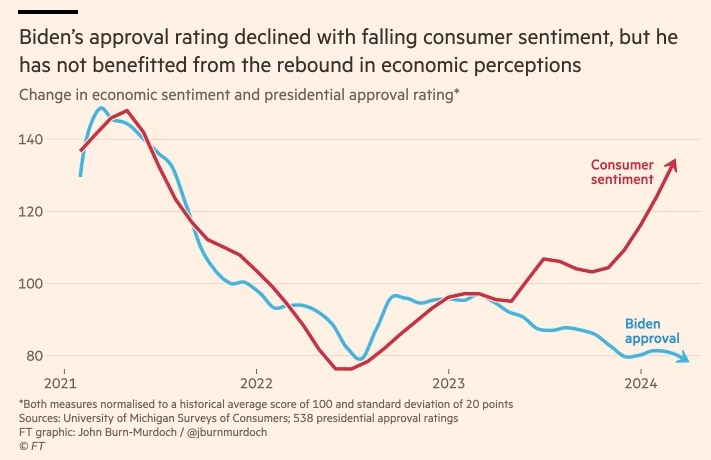Government
TIME To Panic: Joe Biden’s Campaign “In Trouble” Despite Obama Warning
TIME To Panic: Joe Biden’s Campaign "In Trouble" Despite Obama Warning
"Don’t underestimate Joe’s ability to fuck things up." -Barack…

"Don’t underestimate Joe’s ability to fuck things up." -Barack Obama
With less than eight months before the 2024 election, the Biden re-election campaign is in big trouble. Not only is Biden lagging in the polls vs. Donald Trump, the border crisis he created by shredding all of Trump's Executive Orders on immigration has resulted in 10 million illegals flooding into the United States - which has left even Democrats livid.
What's more, Biden is quickly losing the support of young Americans, and the latino vote.
Things are so bad that TIME magazine has just devoted 3,700 words to let us know that Barack Obama 'warned' the Biden campaign last June that defeating Trump would be harder in 2024 (because no pandemic or hoax dossier to set him up?). Six months later, Obama 'saw few signs of improvement.'
Obama returned to the White House in December, with a 'more urgent' message: the re-election campaign was behind schedule in building out field operations, and that an 'insular group of advisers' in the West Wing was hamstringing the effort.
Now, it's really bad...
Three months later, the 2024 general election is under way, and Biden is indeed in trouble. His stubbornly low approval ratings have sunk into the high 30s, worse than those of any other recent President seeking re-election. He’s trailed or tied Trump in most head-to-head matchups for months. Voters express concerns about his policies, his leadership, his age, and his competency. The coalition that carried Biden to victory in 2020 has splintered; the Democrats’ historic advantage with Black, Latino, and Asian American voters has dwindled to lows not seen since the civil rights movement. -TIME
Meanwhile, Biden's inner circle is "defiantly sanguine" as a "fog of dread" descends on Democrats.
The rest of the TIME article is full of anecdotes of dissatisfied Democrats, particularly young voters such as 20-year-old Aidan Kohn-Murphy.
It has nothing to do, as many assume, with the President’s age. With palpable frustration, Kohn-Murphy enumerates the list of perceived policy “betrayals” as though they were “tattooed on the back of my hand.”
According to the report, GenZ voters "don’t understand why they should be compelled to cast their ballot for a candidate who has done so many things that are against their values," said Kohn-Murphy.
Losing the minority vote
In 2020, Biden carried 87% of the black vote. Now, he's polling at just 63%, a sharp decline. Meanwhile four years ago he won hispanic votes by a ratio of 2 to 1. He now trails Trump in that bloc.
Biden's support of Israel amid the Gaza war has "tanked his standing with Muslim and Arab voters," particularly in "must-win Michigan."
Overall, Biden’s advantage over Trump among nonwhite Americans has shrunk from almost 50 points in 2020 to 12, according to the latest Times/Siena poll.
"It boils down to voters of color, and those voters are pissed," said one former Biden campaign and White House official, who spoke on condition of anonymity. "I think it’s very likely he’ll lose."
What's more, nearly two dozen senior Democratic sources told TIME that Biden's "campaign mechanics, structure, and staffing over most of the past year are partly to blame as well."
While Obama was marching to re-election over the summer of 2012, his campaign head count topped 900. Despite plans to hire 350 new staffers, the Biden campaign ended 2023 with only around 70 paid employees, according to campaign finance filings.
Biden advisers don't care about the president's dismal numbers with young and nonwhite voters, as the "Biden brain trust" thinks they'll vote for him again regardless.
"We’ve reached out to this group of nonwhite and young voters earlier than any presidential campaign ever has," according to senior adviser Becca Siegel.
Good luck with that...

Spread & Containment
Japanese Preprint Calls For mRNA VaccinesTo Be Suspended Over Blood Bank Contamination Concerns
Japanese Preprint Calls For mRNA VaccinesTo Be Suspended Over Blood Bank Contamination Concerns
Authored by Naveen Athrappully via The Epoch…

Authored by Naveen Athrappully via The Epoch Times (emphasis ours),
Receiving blood transfusion from COVID-19-vaccinated individuals could pose a medical risk to unvaccinated recipients since numerous adverse events are being reported among vaccinated people worldwide, according to a recent study from Japan.
The preprint review, published on March 15, examined whether receiving blood from COVID-19-vaccinated individuals is safe or poses a health risk. Many nations have reported that mRNA vaccine usage has resulted in “post-vaccination thrombosis and subsequent cardiovascular damage, as well as a wide variety of diseases involving all organs and systems, including the nervous system,” it said.
Repeated vaccinations can make people more vulnerable to COVID-19, it said. If the blood contains spike proteins, it becomes necessary to remove these proteins prior to administration, and there is no such technology currently available, the authors wrote.
Contrary to earlier expectations, genes and proteins from genetic vaccines have been found to persist in the blood of vaccine recipients for “prolonged periods of time.”
In addition, “a variety of adverse events resulting from genetic vaccines are now being reported worldwide.” This includes a wide range of diseases related to blood and blood vessels.
Some studies have reported that the spike protein in the mRNA vaccines is neurotoxic and capable of crossing the blood-brain barrier, the review stated. “Thus, there is no longer any doubt that the spike protein used as an antigen in genetic vaccines is itself toxic.”
Moreover, people who have taken multiple shots of mRNA vaccines can have several exposures to the same antigen within a small time frame, which may lead to them being “imprinted with a preferential immune response to that antigen.”
This has resulted in COVID-19 vaccine recipients becoming “more susceptible to contracting COVID-19.”
Given such concerns, medical professionals should be aware of the “various risks associated with blood transfusions using blood products derived from people who have suffered from long COVID and from genetic vaccine recipients, including those who have received mRNA vaccines.”
The impact of such genetic vaccines on blood products as well as the actual damage caused by them are currently unknown, the authors wrote.
“In order to avoid these risks and prevent further expansion of blood contamination and complication of the situation, we strongly request that the vaccination campaign using genetic vaccines be suspended and that a harm–benefit assessment be carried out as early as possible.”
Repeated vaccination of genetic vaccines can also end up causing “alterations in immune function” among recipients. This raises the risk of serious illnesses due to opportunistic infections or pathogenic viruses, which would not have been an issue if the immune system were normal, the review said.
“Therefore, from the perspective of traditional containment of infectious diseases, greater caution is required in the collection of blood from genetic vaccine recipients and the subsequent handling of blood products, as well as during solid organ transplantation and even surgical procedures in order to avoid the risk of accidental blood-borne infection,” it stated.
The review was funded by members of the Japanese Society for Vaccine-related Complications and the Volunteer Medical Association. Authors did not declare any conflict of interest.
Dangers With Blood Transfusions
The review pointed out that the genetic vaccination status of blood donors is not collected by organizations even though the use of such blood may pose risks to patients. As such, authors recommended that when blood products are derived from such people, “it is necessary to confirm the presence or absence of spike protein or modified mRNA as in other tests for pathogens.”
“If the blood product is found to contain the spike protein or a modified gene derived from the genetic vaccine, it is essential to remove them,” it stated. “However, there is currently no reliable way to do so.”
Since “there is no way to reliably remove the pathogenic protein or mRNA, we suggest that all such blood products be discarded until a definitive solution is found.”
The authors pointed out that cases of encephalitis among people who received blood from dengue vaccine recipients were reported as recently as last year. This suggests that the present system of tracking and managing blood products “is not adequate.”
Since genetic vaccines were implemented on a global scale for a massive population, “it is expected that the situation will already be complicated” compared to previous drug disasters.
As such, there is an “urgent need” for legislation and international treaties related to the management of blood products, the authors wrote.
The issue of blood transfusion from COVID-19 vaccine recipients has been highly controversial. In 2022, a court in New Zealand ruled against the parents of a sick infant son after they refused blood transfusions from vaccinated people.
The parents had asked the health system to allow blood transfusion from unvaccinated individuals, with donors who were already prepared to contribute. In its ruling, the court stripped the parents of medical custody of their son.
In Canada, doctors have also reported the trend of people’s resistance to vaccinated blood transfusions. Speaking to CBC in 2022, Dr. Dave Sidhu, the southern Alberta medical lead for transfusion and transplant medicine, said that parents of sick children were requesting unvaccinated blood.
“We’re seeing it about once or twice a month, at this stage. And the worry is of course that these requests might increase,” he said at the time.
In Wyoming, Rep. Sarah Penn (R-Wyo.) has sponsored a bill mandating that blood donated by people who have taken COVID-19 shots be labeled. Doing so will allow recipients who do not wish to accept such blood to reject them.
In an interview with Cowboy State Daily, Ms. Penn said, “For various reasons, many people have purposefully strived to keep the mRNA therapies out of their bodies, even to the point that some lost their livelihoods … Their concerns are warranted.”
International
The Realpolitik Grand Divergence
The diverging relationship between economic performance and political success in the U.S. highlights a shift from the past, where a strong economy positively…

The diverging relationship between economic performance and political success in the U.S. highlights a shift from the past, where a strong economy positively impacted incumbent approval ratings. President Biden’s approval ratings remain unaffected despite recent economic improvements, suggesting a decoupling of economic sentiment and political fortunes. This phenomenon, which contrasts with stable economic-political linkages in Europe, is attributed to the U.S.’s heightened partisan divide, where political allegiance increasingly dictates economic perception, challenging the traditional belief that “It’s the economy, stupid” in American politics.
Key Points:
- President Clinton’s political advisor, James Carville, highlighted the economy’s role in political success during 1992 presidential campaign with assertion, “It’s the economy, stupid.”
- Voter sentiment has traditionally linked to economic performance, affecting incumbent party success.
- Recent trends show a disconnect between the U.S. economy’s health and President Biden’s approval ratings.
- The COVID-19 pandemic and inflation crisis may have influenced this anomaly, yet the shift predates these events.
- Research indicates a decoupling of economic sentiment and presidential approval in the U.S. since Obama’s tenure.
- This phenomenon seems unique to the U.S., with European governments’ popularity still tied to economic conditions.
- U.S. political polarization may explain the decoupling, with partisan views influencing economic perceptions.
- Studies suggest that political biases skew individual economic assessments (confirmation bias) impacting presidential approval.
- The current U.S. political climate suggests economic policy impact on electoral decisions is diminishing.
- Contrasts with Europe, where economic sentiment is more uniform across political lines, suggesting a more rational political-economic relationship.
Source: Financial Times
european europe pandemic covid-19Government
FDA Settles Ivermectin Case, Agrees To Remove Controversial ‘Stop It’ Post
FDA Settles Ivermectin Case, Agrees To Remove Controversial ‘Stop It’ Post
Authored by Zachary Steiber via The Epoch Times (emphasis ours),
The…

Authored by Zachary Steiber via The Epoch Times (emphasis ours),
The U.S. Food and Drug Administration (FDA) has agreed to remove social media posts and webpages that urged people to stop taking ivermectin to treat COVID-19, according to a settlement dated March 21.
The FDA has already removed a page that said: “Should I take ivermectin to prevent or treat COVID-19? No.”
Within 21 days, the FDA will remove another page titled, “why you should not use ivermectin to treat or prevent COVID-19,” according to the settlement announcement, which was filed with federal court in southern Texas.
“The FDA has not authorized or approved ivermectin for use in preventing or treating COVID-19 in humans or animals,” the page currently states. It also says that data do not show ivermectin is effective against COVID-19, despite how some studies it cites show ivermectin is effective against the illness.
The FDA in the settlement is also agreeing to delete multiple social media posts that came out strongly against ivermectin, including one that stated: “You are not a horse. You are not a cow. Seriously, y’all. Stop it.”
In exchange, doctors who sued the agency are dismissing their claims, the filing states.
“FDA loses its war on ivermectin and agrees to remove all social media posts and consumer directives regarding ivermectin and COVID, including its most popular tweet in FDA history,” Dr. Mary Talley Bowden, one of the doctors, said in a statement. “This landmark case sets an important precedent in limiting FDA overreach into the doctor-patient relationship.”
“We are extremely pleased with the outcome of the settlement as it is a victory for every doctor and patient in the United States,” added Dr. Paul Marik, chief scientific officer of the FLCCC Alliance and another plaintiff. “The FDA interfered in the practice of medicine with their irresponsible language and posts about ivermectin. We will never know how many lives were affected because patients were denied access to a lifesaving treatment because their doctor was ‘just following the FDA.’”
An FDA spokesperson told The Epoch Times in an email that the agency “has chosen to resolve this lawsuit rather than continuing to litigate over statements that are between two and nearly four years old.”
“FDA has not admitted any violation of law or any wrongdoing, disagrees with the plaintiffs’ allegation that the agency exceeded its authority in issuing the statements challenged in the lawsuit, and stands by its authority to communicate with the public regarding the products it regulates,” the spokesperson said. “FDA has not changed its position that currently available clinical trial data do not demonstrate that ivermectin is effective against COVID-19. The agency has not authorized or approved ivermectin for use in preventing or treating COVID-19.”
Ivermectin was approved by the FDA in 1996 to treat several conditions, including onchocerciasis, a tropical disease caused by a parasitic worm.
In the United States, it’s common for doctors to prescribe medicine off-label, or for a different purpose than the one for which the medicine is approved.
After some doctors began prescribing ivermectin for COVID-19, the FDA ramped up its campaign, including the Aug. 21, 2021, post on Twitter, now known as X.
Dr. Bowden and two other doctors sued the FDA, arguing the agency’s actions went beyond its authority, as conferred on it by Congress.
U.S. District Judge Jeffrey Brown dismissed the case in 2022, ruling that the FDA did not act outside the authority. But an appeals court in 2023 ruled in favor of the doctors, finding that the agency “has identified no authority allowing it to recommend consumers ‘stop’ taking medicine.”
Between the time of the ruling and the settlement, the FDA refused to change any of its statements on ivermectin, and asked for a fresh dismissal of the suit.
The Case
Drs. Robert Apter, Bowden, and Marik brought the case in 2022. They said they suffered repercussions after prescribing ivermectin to patients with COVID-19, and that the FDA was to blame.
Dr. Apter, for instance, said that pharmacists refused to fill the prescriptions, citing the FDA.
“This refusal delays his patients in obtaining their prescribed treatment—when early intervention is paramount—while they look for a pharmacy to fill their prescription, if they can find one at all,” the suit states.
He also said that insurance companies were refusing to pay for ivermectin to treat COVID-19.
The suit said the FDA illegally interfered with the relationships between the doctors and patients. The doctors said with regard to ivermectin, the FDA overstepped the authority conferred on it in the Federal Food, Drug, and Cosmetic Act.
Government lawyers argued that the FDA was acting within the confines of the law, and succeeded in getting the dismissal.
Judge Brown, appointed under President Donald Trump, said the FDA’s powers were only limited with regard to medical devices.
“As there is no statute limiting the FDA’s actions here, it cannot have acted outside of any statutory limitations,” he wrote in his ruling. “Further, it cannot be said that the FDA had no colorable basis of authority. The FDA is charged by Congress with protecting public health and ensuring that regulated medical products are safe and effective, among other things.”
A three-judge panel of the U.S. Court of Appeals for the Fifth Circuit disagreed, finding that the law did not authorize the FDA to give medical advice.
“FDA can inform, but it has identified no authority allowing it to recommend consumers ‘stop’ taking medicine,” U.S. Circuit Judge Don Willett, appointed under President Trump, wrote for the court. The appeals court remanded the case back to the district court.
-

 Spread & Containment2 weeks ago
Spread & Containment2 weeks agoIFM’s Hat Trick and Reflections On Option-To-Buy M&A
-

 Uncategorized1 month ago
Uncategorized1 month agoAll Of The Elements Are In Place For An Economic Crisis Of Staggering Proportions
-

 International2 weeks ago
International2 weeks agoEyePoint poaches medical chief from Apellis; Sandoz CFO, longtime BioNTech exec to retire
-

 Uncategorized4 weeks ago
Uncategorized4 weeks agoApparel Retailer Express Moving Toward Bankruptcy
-

 International2 weeks ago
International2 weeks agoWalmart launches clever answer to Target’s new membership program
-

 International2 days ago
International2 days agoParexel CEO to retire; CAR-T maker AffyImmune promotes business leader to chief executive
-

 Uncategorized1 month ago
Uncategorized1 month agoGOP Efforts To Shore Up Election Security In Swing States Face Challenges
-

 Uncategorized4 weeks ago
Uncategorized4 weeks agoKey Events This Week: All Eyes On Core PCE Amid Deluge Of Fed Speakers







